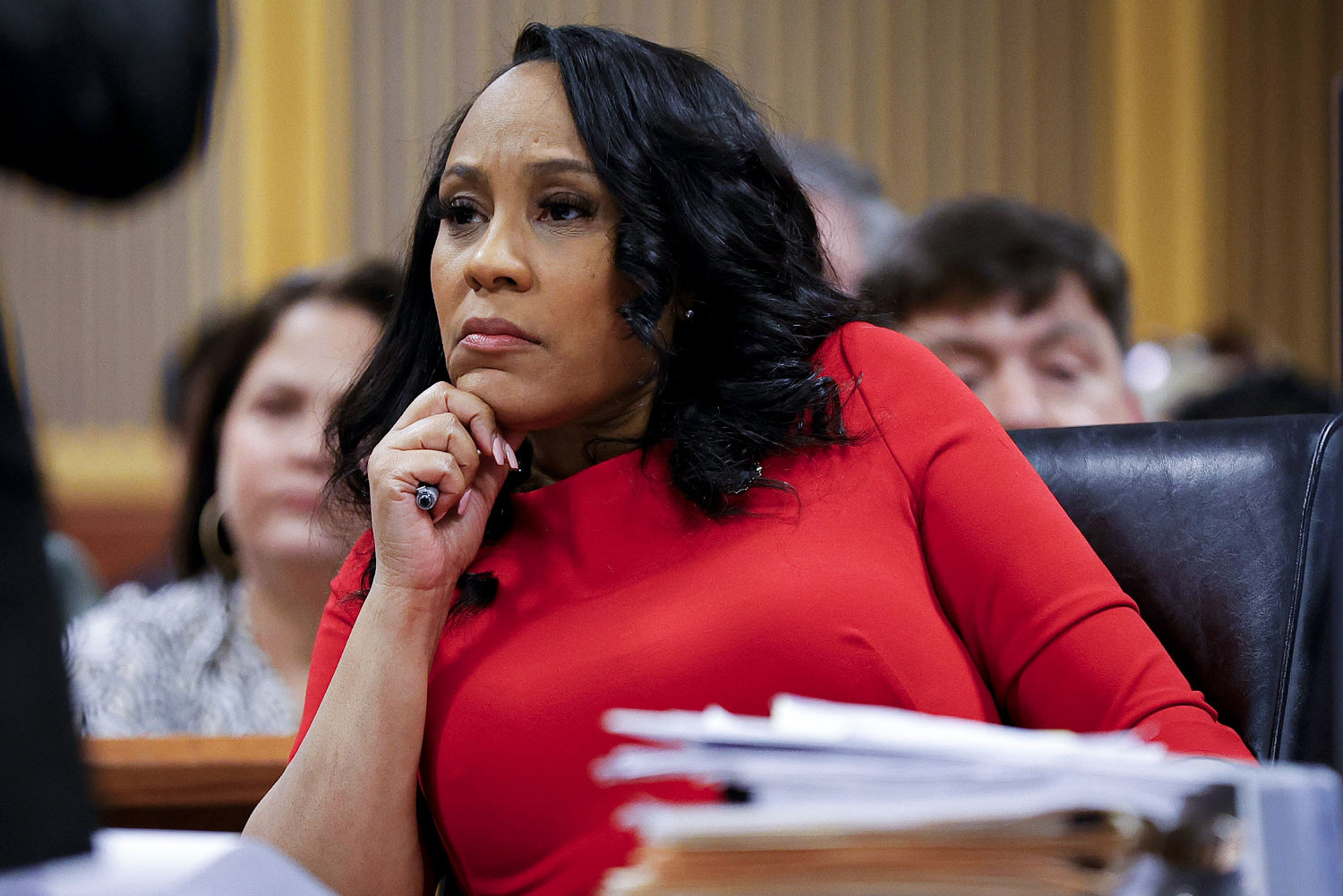
The fate of Fulton County District Attorney Fani Willis in the Donald Trump state RICO case has been decided by Judge Scott McAfee… and he got it right. McAfee’s denial in part and granting in part of the defendants’ motion to disqualify was a sound decision grounded in the proper legal standard in Georgia, as well as on the evidence that was entered into the record during the course of a multi-day, multi-hour evidentiary hearing.
Although his ruling was sharply critical of Willis’ judgment in her personal relationship with special prosecutor Nathan Wade and of her demeanor on the witness stand during the hearing, ultimately McAfee ruled that there was no actual conflict of interest and despite an appearance of impropriety, it could be cured by the selection of one of the following options: either Willis and her office steps down or Wade withdraws.
Now that McAfee has finally issued his ruling, the case can get back on track, proceed with further discovery, motion practice, and hopefully finally be set for trial.
As a part of his decision-making process, McAfee evaluated the credibility of all of the witnesses who took an oath to tell the truth and offered testimonial evidence during the course of the hearing.
One of the biggest questions that has now been answered by McAfee’s decision is which legal standard he would apply to this disqualification motion. Several of us argued that legal precedent required that he determine if there was the existence of an actual conflict of interest on Willis’ part — an “actual conflict of interest” being defined as the prosecutor having “acquired a personal interest or stake in the defendant’s conviction.” This conflict of interest under the law must be actual, not theoretical or speculative.
Counsel for the defendants, on the other hand, argued that the appearance of a conflict of interest by a prosecutor was sufficient to sustain disqualification. In the end, Judge McAfee explicitly ruled that there was no evidence of an actual conflict of interest on the part of Willis in “her personal relationship and recurring travels” with Wade. However, in somewhat of a hybrid legal decision, McAfee also found that the court “must consider the appearance of impropriety” when considering disqualification of a prosecutor and he found that this prosecution “is encumbered by an appearance of impropriety” and thus the reason why he decided that either Willis and her entire office steps aside or Wade withdraws from the case.
To be clear, it was the defendants’ burden, as the movants, to present competent, relevant, credible and admissible evidence in support of their claims and allegations. Absent that type of evidence, their motion would fail. And fail it did.
Unless, of course, the only purpose for filing the disqualification motion in the first place was simply to sully the name and reputation of two prosecutors who happen to be pursuing felony charges against the former president of the United States. In that case, the defense arguably succeeded. But, at what cost? Ashleigh Merchant, the defense attorney for Michael Roman, filed the original motion to disqualify and to dismiss the indictment and ended up left holding the bag when it became publicly obvious that she had relied almost exclusively on gossip and innuendo fed to her by Terrence Bradley, Nathan Wade’s former divorce lawyer, law partner and friend, for her client’s motion.
As a part of his decision-making process, McAfee evaluated the credibility of all of the witnesses who took an oath to tell the truth and offered testimonial evidence during the course of the hearing. Based on his ruling, he found the testimony of Robin Yeartie, Willis’ former friend and former employee of the Fulton County DA’s Office, to be “lacking in context and detail.” Recall that Yeartie had testified that the personal relationship between Wade and Willis began in 2019 before Wade was appointed as a special prosecutor in this case. She was called by the defense to counter Willis and Wade’s sworn claims that their relationship did not begin until 2022.
More importantly, it’s also apparent that McAfee rejected the arguments from defense counsel that Bradley had shared with third parties, including Merchant, what Bradley claims was knowledge that Wade and Willis’ personal relationship had begun as far back as 2019. Bradley’s credibility was shot when he admitted on the witness stand that he had no personal knowledge of their relationship and that he had only heard things about it. When pressed on cross-examination by the defense, Bradley persisted in his position that the information he had provided to Merchant and others was not based on his personal, first-hand knowledge of any intimate relationship between Wade and Willis. The so-called “star witness” for the defense fizzled and the defense was left frustrated and unable to advance any further. The Court explicitly ruled that it was “unable to place any stock in the testimony” of Bradley.
It’s also evident from his ruling that McAfee rejected the proposition asserted by the defense that Wade’s cellphone records prove that Wade and Willis were having some torrid love affair in 2021 prior to him being appointed as a special prosecutor. Trump’s lawyer and the other counsel held these records up as some sort of smoking gun that showed that Wade and Willis were not telling the truth. However, the state countered with the fact that a cellphone pinging off of a tower does not provide with specificity where someone is located and it certainly doesn’t tell you what the person was doing during that time. McAfee considered this evidence and properly determined that it failed to “conclusively establish by a preponderance of the evidence when the relationship evolved into a romantic one.”
Those kinds of decisions — which side makes more sense, which position with which to agree, which witness to believe — are a judge’s bread and butter. A judge is supposed to call balls and strikes with impartiality and fairness. A jury is supposed to do the same. The biggest difference, of course, is that a judge has legal training and experience, so at times is arguably better suited for making those kinds of calls. And in the context of an evidentiary hearing, when McAfee serves as the judge and the jury and when he gets to determine credibility and trustworthiness, the judge’s role becomes even more important.
Do not expect this to be the last that we hear about challenges to Willis remaining on this prosecution
McAfee’s ruling, however, did not clear Wade and Willis from further scrutiny. Finding that “an odor of mendacity remains” and that “reasonable questions about whether [Willis] and [Wade] testified untruthfully about the timing of their relationship,” McAfee wrote that the “significant appearance of impropriety…infects the current structure of the prosecution team.” The defense will certainly pursue all available remedies from appeal to referrals to the Georgia State Bar. Do not expect this to be the last that we hear about challenges to Willis remaining on this prosecution.
From the beginning, my concern about this disqualification hearing was the damage that was being done to the judicial process itself. Prosecutors, especially the district attorneys who lead their offices, are constantly being assailed for their filing decisions and for the exercise of their prosecutorial discretion in pursuing certain charges against certain defendants. None of that is new. However, the weaponization of the judicial system to conduct personal smear campaigns and to create a circus sideshow atmosphere further erodes what the public thinks about how the process works.
Willis, during her testimony, made it clear to the defense: “You’re confused. You think I’m on trial. These people are on trial for trying to steal an election in 2020. I’m not on trial! No matter how hard you try to put me on trial.” Truer words were never spoken. This case was never about the personal travel and dating life of Willis and Wade. It was about 19-plus individuals, including the 45th president of the United States, attempting to overturn the results of the 2020 election in the state of Georgia. This case was always about Trump’s Jan. 2, 2021 pressure call to Georgia Secretary of State Brad Raffensperger to “find him 11,780 votes.” This case was always about a coordinated scheme to assert unfounded election fraud claims and install fake electors across multiple states in order to cheat American voters of their lawful selection for the Oval Office.
The defense failed to meet its burden of proof during the evidentiary hearing and McAfee ruled accordingly. Now, Willis will have to carry her burden of proof, beyond and to the exclusion of every reasonable doubt, that Trump and his co-defendants are guilty of the crimes for which they have been indicted. And America will wait and watch for that outcome.
![]()






